One-on-one chemistry tutoring – in-person or online – can dramatically improve students’ grasp of complex topics in general and organic chemistry, boosting confidence, grades, and enjoyment of learning.
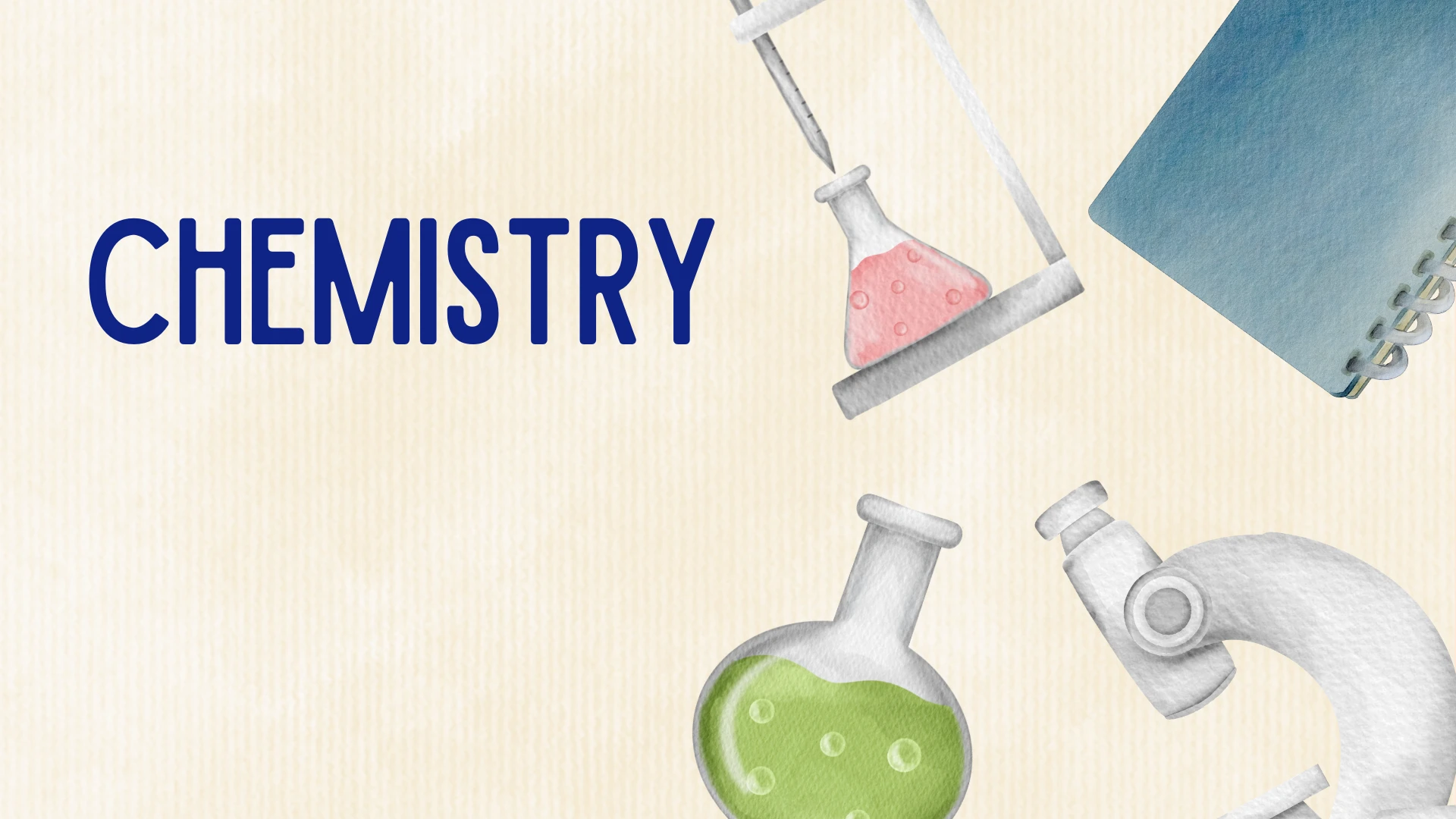
Why Chemistry Is Challenging
Take Sofia, a high school junior in Dubai preparing for her final chemistry exam. Her biology grades are excellent, but she finds the organic chemistry chapter on reaction mechanisms confusing. Weeks of struggling through her chemistry homework left her frustrated. Looking for help, Sofia searched online for “chemistry homework help” and connected with an expert tutor. With personalized guidance on each problem, she finally began to understand how molecules react. Stories like Sofia’s are common: many students in the USA, UK, and Gulf regions find chemistry demanding and turn to private tutoring for extra support. In the U.S., for example, fewer than a quarter of schools provide intensive science tutoring, so students often look for help outside the classroom.
Chemistry mixes abstract concepts with math and memorization. Topics like atomic orbitals, chemical equilibrium, and lab techniques can be hard to visualize, especially when taught only in a large class. Organic chemistry adds its own hurdles: learning the structures, functional groups, and hundreds of reaction mechanisms creates a steep learning curve. In fact, chemistry classes often act as “gatekeeper” courses. For example, introductory chemistry classes frequently have high drop/fail rates, highlighting how many students struggle without extra help.
To understand why this dropout rate is so high, we need to look at the three unique hurdles chemistry presents simultaneously.
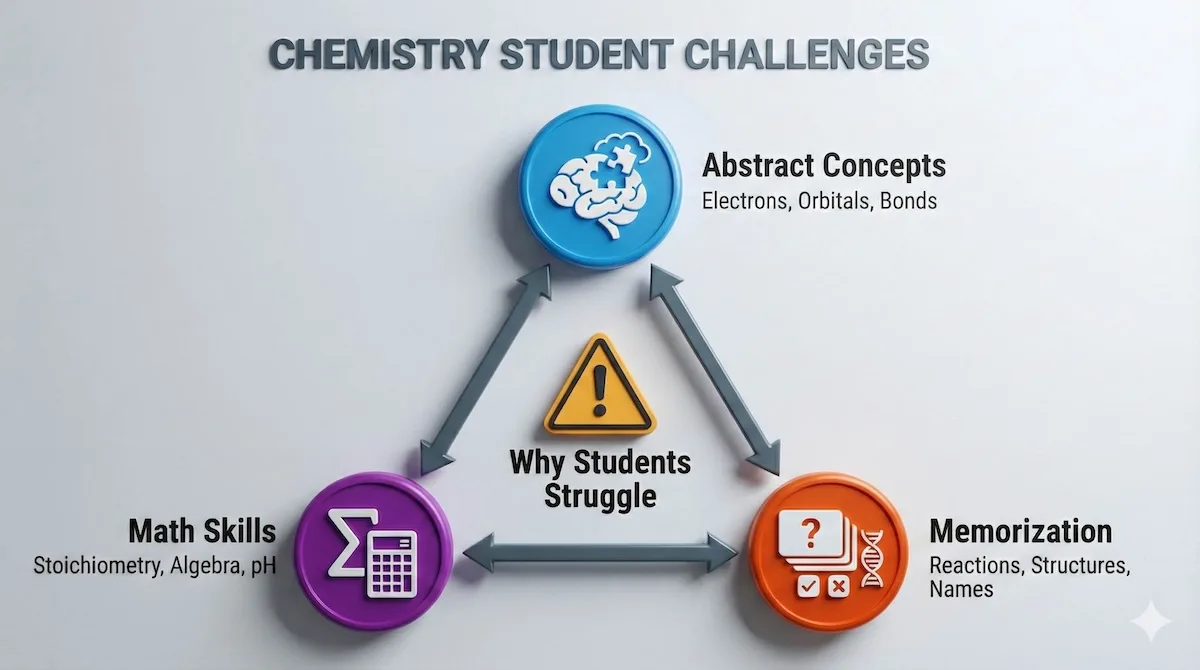
Visualizing the three core challenges—math, abstract concepts, and memorization—helps students identify exactly where they need extra support.
As shown above, the combination of abstract theory, heavy math, and rote memorization creates a ‘perfect storm’ for many students.
- Abstract concepts (e.g. electrons, bonds, 3D molecular shapes) are tough to imagine without guidance.
- Strong math skills are needed (stoichiometry, algebra, and even calculus are common in chemistry).
- Organic chemistry demands memorizing many reactions and understanding spatial relationships.
- Lecture classes move quickly, so knowledge gaps can grow over time.
- Intro chemistry can feel like “applied math” – students may get A’s by solving equations without fully grasping the concepts.
- Overall, nearly one in three students fail or drop out of intro chemistry courses.
Organic vs. General Chemistry
General chemistry (often taught in grades 11–12 or as an introductory college course) covers fundamentals: atomic structure, periodic trends, chemical reactions, and laboratory skills. Organic chemistry (typically in higher grades or college) focuses on carbon-containing compounds: drawing molecular structures, naming molecules, and understanding reaction mechanisms. While general chemistry problems often involve numerical calculations (for example, finding pH or molarity), organic chemistry requires visualizing complex molecular structures and multi-step reactions. A tutor might help a student work through a stoichiometry problem in general chemistry, but in organic chemistry the tutor could use diagrams or models to show how a reaction proceeds. By understanding these differences, tutors can tailor their teaching to each subject.
The shift in thinking required between these two subjects can be jarring. Here is a breakdown of how the primary skills differ:
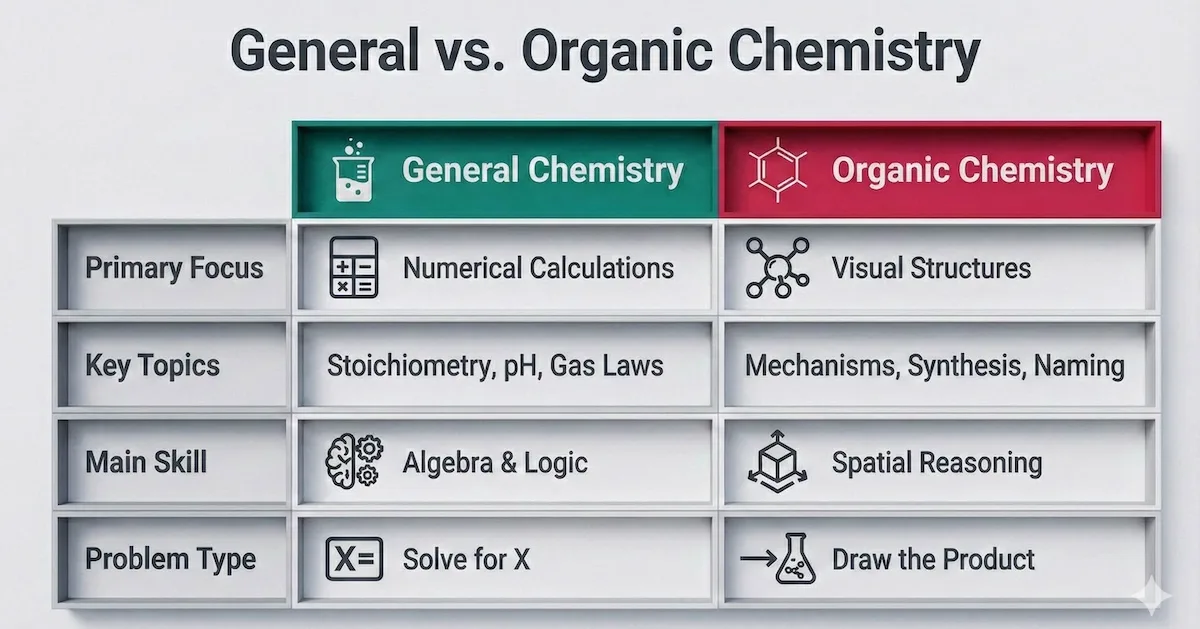
Understanding the difference between the math-heavy General Chemistry and the visual nature of Organic Chemistry is key to choosing the right study strategy.
Recognizing this shift from calculation to visualization is the first step in adjusting your study habits for organic chemistry.
The Role of Chemistry Tutors and Teachers
A chemistry teacher provides classroom lectures and demonstrations, but a private chemistry tutor offers personalized lessons that target a student’s weak areas. In a busy class of 30, a chemistry teacher can’t answer every question or reteach a topic on the spot. A tutor, on the other hand, can work one-on-one with the student. The tutor can adjust the pace, explain concepts in new ways, and review homework problems until the student fully understands. This extra support complements regular chemistry teaching by reinforcing concepts and building confidence outside the standard classroom setting.
High-quality tutoring has proven effects. For example, education experts note that tutoring programs can produce much larger learning gains than standard instruction. One analysis found high-impact tutoring to be up to twenty times more effective than traditional lessons in improving math achievement (with similarly impressive results in reading). In short, many students benefit from the focused attention and repeated practice that a tutor provides.
The data supports this approach. When we compare standard classroom instruction to personalized one-on-one support, the difference in outcomes is stark.
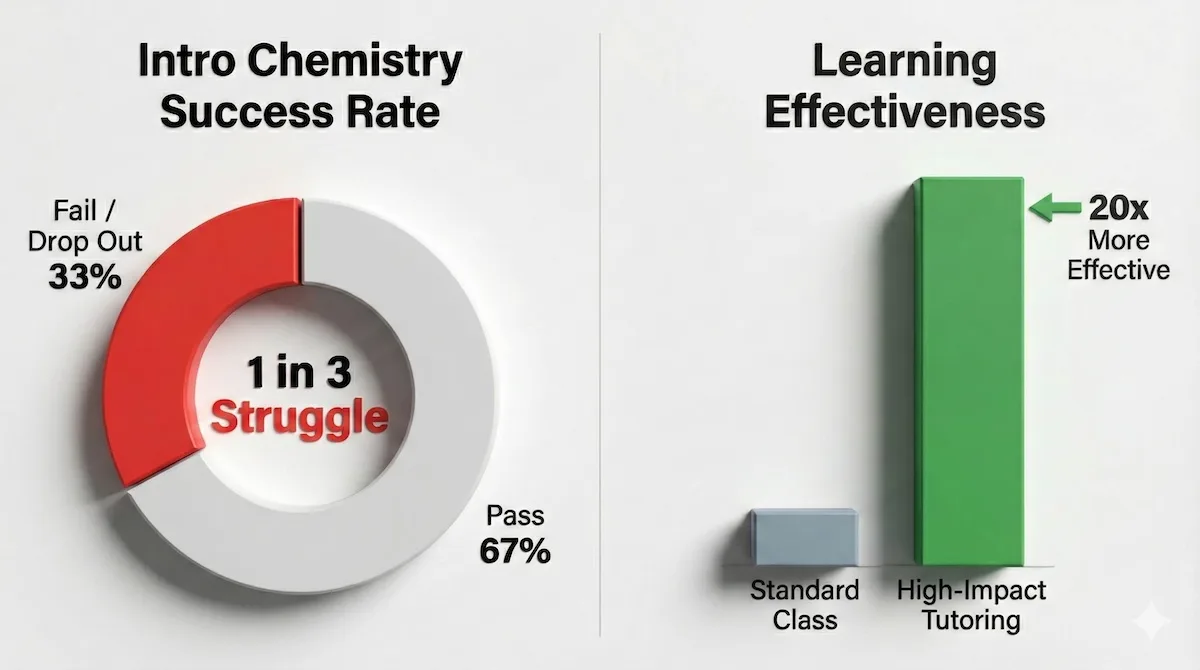
Statistics show that while introductory chemistry has high dropout rates, personalized tutoring can dramatically increase learning effectiveness.
With high-impact tutoring proving to be up to 20 times more effective, it’s clear that personalized attention bridges the gap that large lectures often leave.
Benefits of Chemistry Tutoring
- Personalized pace: Tutors can slow down or speed up depending on the student’s needs, ensuring mastery of each topic.
- Focused attention: One-on-one sessions mean students can ask questions freely and correct misunderstandings immediately.
- Homework and assignment help: Tutors guide students through chemistry problems and lab reports step by step, reinforcing learning rather than just giving answers. Effective tutors emphasize understanding, not shortcuts.
- Flexible tools: Online tutoring often uses digital whiteboards, shared simulations, and video to illustrate concepts (very useful for visualizing molecules in organic chemistry).
- Real-world context: A good tutor may relate chemistry concepts to everyday life (like cooking reactions, battery chemistry, or biological molecules), making abstract ideas more engaging and understandable.
- Confidence building: Regular positive feedback and small successes in tutoring sessions help students feel more confident tackling chemistry questions in class and on tests.
- Study skills: Tutors often teach problem-solving strategies, note-taking, and test-prep techniques that benefit students across all subjects.
In-Person vs Online Chemistry Tutoring
- Online Tutoring: Students connect with tutors via video chat and interactive tools. This offers great flexibility – you can schedule sessions at convenient times and work from anywhere. Online tutoring also broadens the pool of tutors. For example, a student in London might study with a chemistry specialist in the USA, or a student in Dubai can work with an instructor in India. Many platforms record sessions, so you can revisit explanations later.
- In-Person Tutoring: Meeting a tutor face-to-face (at home, in a library, or a tutoring center) can be effective for hands-on learning. In-person sessions may include working with physical models, chemistry kits, or writing on a blackboard. Some students prefer the personal connection of in-person tutoring. However, scheduling is often less flexible than online, and tutor options depend on your location.
Whether online or offline, a good chemistry tutor will use the right tools to help you learn. For instance, an online tutor might use a digital whiteboard to solve an equation or display a 3D molecular model, while an in-person tutor could use paper and physical models. The tools differ, but the goal is the same: building the student’s understanding.
Struggling to decide which format fits your lifestyle? Let’s compare the unique advantages of each approach side-by-side.
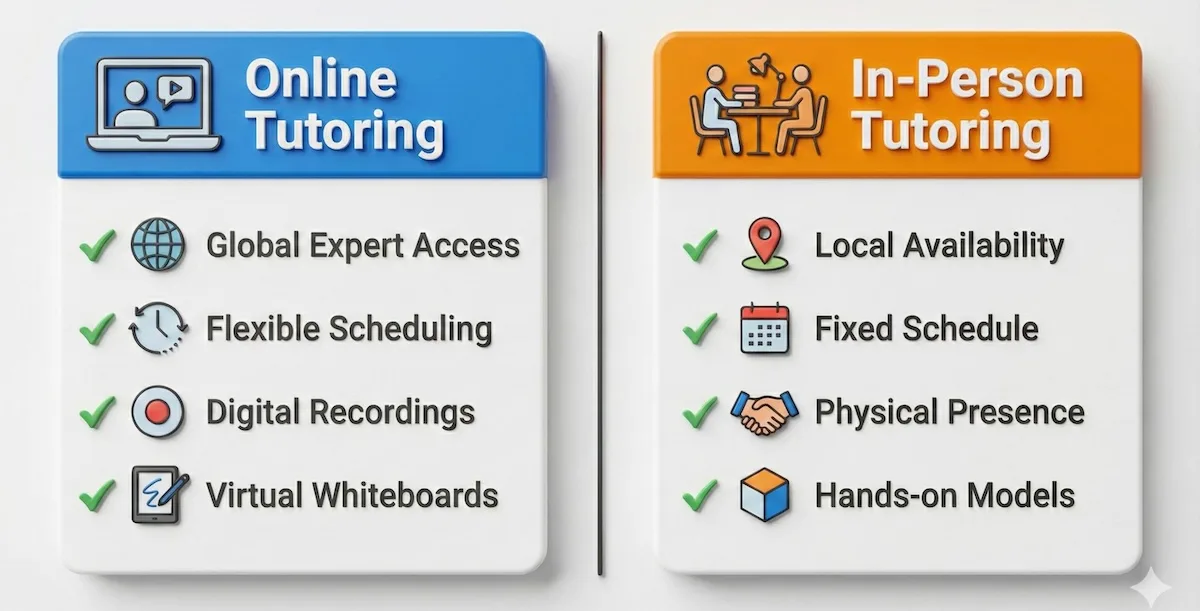
Whether you choose the flexibility of online sessions or the physical presence of in-person learning, both formats offer distinct advantages.
Ultimately, the right choice depends on whether you prioritize the flexibility of online tools or the tactile experience of in-person learning.
Both formats – an in-person chemistry tutor or a chemistry tutor online – can be highly effective. What matters most is the quality of the tutor’s guidance and the student’s engagement during sessions.
Finding and Hiring a Chemistry Tutor
If tutoring sounds like the right step, how do you find the right chemistry tutor? Start by checking credentials: a strong tutor might be a current or former chemistry teacher, a chemistry graduate student, or an experienced educator. Look for positive reviews or ask for references. Ensure the tutor has expertise that matches your course (for example, AP Chemistry for a US student, A-Level or IB Chemistry for UK/Gulf students, etc.).
- Review qualifications: Choose a tutor who studied chemistry (degree or teaching experience) and understands your syllabus.
- Clarify goals: Explain whether you need help with general chemistry, organic chemistry, homework assignments, or exam preparation.
- Trial session: Many tutors offer a short initial session or consultation. Use this to see if their teaching style and personality fit the student.
- Ask questions: Does the tutor use practice problems and interactive examples? Are they patient and encouraging?
- Compare rates: Tutor rates vary by country and tutor experience, but typically range from about $20 to $40 per hour for high school and college-level chemistry.
- Use trusted platforms: Reputable tutoring websites and educational agencies can match you with qualified chemistry tutors (both in-person and online).
- Beware shortcuts: Some services promise quick “chemistry hw help” or answer keys. Genuine tutors focus on helping you learn the material, not just giving answers.
When you hire a chemistry tutor, make clear what type of help you’re seeking. Are you looking for regular chemistry teaching reinforcement, occasional homework help, or intensive exam review? A good tutor will tailor sessions accordingly. Remember, effective tutoring builds your skills: it’s about learning to solve problems, not just getting someone else to do the homework.
Ready to find the right help? Follow this simple five-step roadmap to ensure you hire a tutor who matches your specific needs.

Follow these five steps to ensure you find a qualified tutor who matches your specific learning goals and schedule.
By following this process, especially checking credentials and booking a trial. you avoid low-quality ‘homework help’ services and find a true educator.
Getting the Most from Chemistry Tutoring
To maximize tutoring, students should be active participants. Begin by preparing specific questions or problem areas for each session, so time is used efficiently. After each session, review the tutor’s explanations and practice the problems on your own. Chemistry is a subject where practice and repetition build mastery, so consistency is key.
- Set clear objectives for each session (e.g. mastering equilibrium calculations).
- Be patient and curious: ask the tutor to explain concepts in different ways until they make sense.
- Apply new skills: do extra practice problems or lab exercises recommended by the tutor.
- Use supplementary resources: online simulations or flashcards can reinforce what you learn in tutoring.
- Stay consistent: weekly or biweekly sessions often yield better results than cramming before a test.
- Stay organized: Keep notes, formulas, and practice problems in an organized notebook or folder so you can easily review them later.
- Stay positive: Celebrate small wins and progress; building chemistry skills takes time and confidence grows step by step.
With a supportive tutor and regular effort, many students find chemistry less intimidating. Tutoring helps not only with homework and exams, but also with long-term understanding. In fact, in England 30% of students aged 11–16 report having used private tutoring, reflecting how common tutoring has become for demanding subjects like science. Whether it’s mastering an organic chemistry synthesis or acing a general chemistry quiz, the right tutor can make all the difference in a student’s success in science.
Frequently Asked Questions
- What is chemistry tutoring? One-on-one or small-group instruction that helps students understand chemistry concepts and problems beyond what they get in the classroom.
- How does online chemistry tutoring work? Students connect with tutors via video calls and shared whiteboards, allowing interactive lessons and real-time problem-solving from home.
- What is the difference between organic and general chemistry tutoring? Tutors adapt their approach: general chemistry tutoring focuses on calculations and fundamental concepts, while organic chemistry tutoring emphasizes understanding molecular structures and reaction mechanisms.
- How can chemistry homework help improve my grades? Getting step-by-step guidance on homework problems ensures you learn from mistakes and really understand the material before tests.
- How do I hire a chemistry tutor? Search trusted tutoring platforms or local agencies, check tutors’ credentials and reviews, and discuss your goals before starting sessions.
- How much does it cost to hire a chemistry tutor? Tutor rates vary, but typically range from about $20 to $40 per hour, depending on the tutor’s qualifications and the complexity of the subject.Subjects come under Chemistry:
Aldehydes and ketones
Analytical Chemistry
Astrochemistry
Atmospheric Chemistry
Atomic Structure
Biophysical Chemistry
Catalysis
ChemDraw
Chemical Bonding
Chemical Equilibrium
Chemical Kinetics
Chromatography
Combinatorial chemistry
Computational Chemistry
Covalent Bonding
Environmental Chemistry
General Chemistry
Ideal Gas Law
Industrial chemistry
Inorganic Chemistry
Lanthanide chemistry
Mass Spectrometry
Natural products chemistry
NMR Spectroscopy
Organic Chemistry
Organometallic Chemistry
Photochemistry
Photovoltaic Cells & Solar Energy Panels
Physical Chemistry
Polymer Chemistry
Quantum Chemistry
Solid State Chemistry
Stereochemistry
Stoichiometry
Supramolecular chemistry
Surface chemistry
Thermochemistry
Transition Metal & Coordination Chemistry
******************************
This article provides general educational guidance only. It is NOT official exam policy, professional academic advice, or guaranteed results. Always verify information with your school, official exam boards (College Board, Cambridge, IB), or qualified professionals before making decisions. Read Full Policies & Disclaimer , Contact Us To Report An Error

